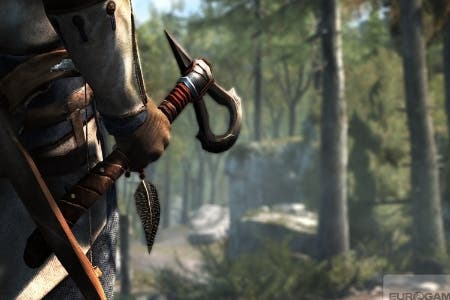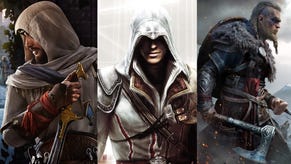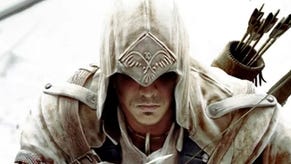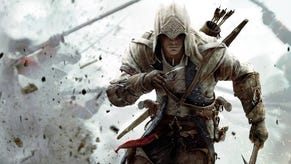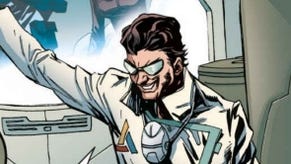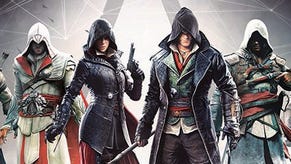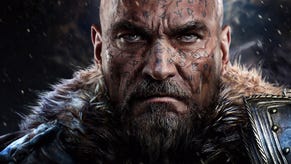Assassin's Creed 3 review
Eagle to please.
They say that size doesn't matter, but size is very hard to look past, especially when you're playing a game like Assassin's Creed 3 - which can take as long as eight hours to open up and present you with the world of tempting objective icons that this fascinating, brilliant and occasionally infuriating action-adventure series has taught us to expect.
The game begins with a quick catch-up video summarising its convoluted sci-fi meta-story, which has already twisted and turned its way across four sprawling instalments prior to this 'third' adventure. This is followed by a semi-playable preliminary sequence reintroducing us to genetic memory explorer Desmond and his pals, which is then followed by an enormous playable prologue at the outset of the American Revolution in Boston and on the Frontier, which is then followed by a few early years with main protagonist Connor, a Native American of mixed descent, which is then followed by his inevitable introduction to the Assassin order and - eventually - the recognised start of the game you're expecting. Concluding chapters in famous trilogies are sometimes guilty of not knowing when to end; Assassin's Creed 3 is somewhat guilty of the opposite.
Even when it does finally get going, the designers continue to tutor and nudge you to try the extraordinary range of mini-games and systems that have been arranged for you along the 1700s Eastern Seaboard. You can capture Templar forts, hunt animals through hill and brush, liberate city districts, attack roving convoys, establish a guild of Assassins, build up your Homestead on the Frontier, trade and craft items, battle the British navy in your ship the Aquila, collect Almanac pages from rooftops, feathers from treetops and pirate trinkets from clifftops, hunt for treasure up and down the coast, play various board games in pubs and inns, rescue citizens from firing squads and oppression, assassinate Templars, and - it's no exaggeration to say - much more. If you are happy to equate length and breadth to value, then there won't be many other games this year that represent more activity per pound or euro. There's even multiplayer on top of that.
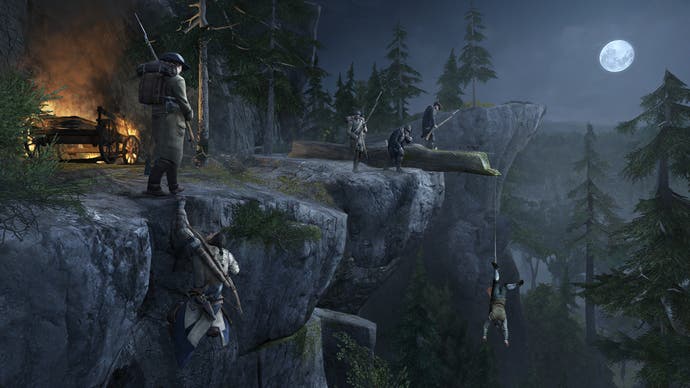
This enormous amount of preamble and peripheral activity isn't there to compensate for a shortfall in the central story, either. Connor's adventure is long and complicated - a traditional series of assassination objectives targeting prominent Templars as they meddle with the politics of the second half of the 18th Century in the emerging United States. It sees him popping up at the Boston Tea Party, the Battle of Bunker Hill and various other landmark events, and rubbing shoulders with everyone from Paul Revere and William Molineux to Charles Lee and George Washington. Typically each story 'Sequence' features a mixture of preparatory missions - chasing down couriers, shadowing people across rooftops, marshalling cannon fire, etc. - followed by a low-profile kill in a high-profile setting, such as sneaking up on a British commander in the middle of a full-scale battle.
Judged purely on the quality of its individual components, Assassin's Creed 3 is an uneven game. Perhaps inevitably, Connor lacks the charm and charisma of his predecessor Ezio Auditore, and it turns out that the great men of the American Revolution were all rather dull people too, with very few magnetic characters like Leonardi da Vinci or the Machiavellian Machiavelli. A couple of Sequences are enjoyable romps where Connor joins forces with an enigmatic adversary, but the chemistry and humour in these scenes just serves to emphasise its absence elsewhere.
Similarly, some of the mini-games and supporting systems feel superfluous and there are a lot of minor bugs. One thing that is consistent, at least, is the feeling that this is no longer a series about a silent predator. The majority of the time, Assassin's Creed 3 is a full-on action game; it just happens to star an assassin.
But Assassin's Creed 3 is nevertheless hugely seductive, and once again it's down to a combination of several key things: the picket fences, wooden-slat houses and straw-lined streets of Boston and New York, along with the vast Frontier - a vibrant forested wilderness of tall trees, thick brush, deep rivers and mountainous undulations - coupled with the huge range of distractions that divert, capture and hold your attention as you attempt even the shortest journey across the game's vast historical backdrops.
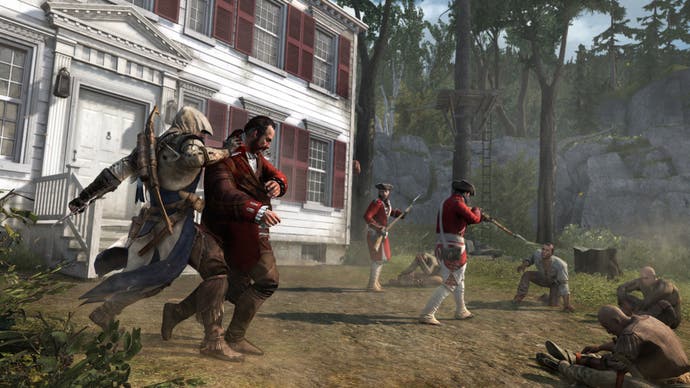
A typical session of Assassin's Creed 3 begins as you consult the world map to pinpoint something you want to do. Perhaps it's visiting a Frontiersman icon, where you'll hear a fireside ghost story that sets you on the trail of a Bigfoot legend or mythical sea monster. But on the way there you'll spy a feather icon greyed out on your mini-map, indicating that it's above you, so you'll discard your horse and clamber into the canopy to collect it. Then you'll swan-dive into the nearest thicket, only to spy a magnifying glass icon centre-screen that gives you a clue to some nearby animal activity. There's a cougar somewhere close, it says, so you lay traps and return to the trees to plot its downfall with bow or hidden blade. But as you approach the tree, a bear attacks! You take it down with well-timed button replies, skin it for its fur and resume hunting. You'll go back to the Homestead later and process the stuff you've gathered to make new goods and earn cash on the trade routes. In the meantime, when the cougar's finished, you try to remember what you were doing in the first place. You return to the world map and it's a sea of future fun.
It's true that the game mechanics and engine are showing their age in places. Riding a horse through the Frontier is a constant frustration as it seems to snag on every rock, branch and tuft of flora. Racing through cities on foot can be fraught as well, as the many different contextual actions available through Connor's economical controls - hanging from this, leaping onto that, dodging round this, hiding behind that - overzealously seize power and arrest momentum when it's least convenient. Combat, meanwhile, remains troublingly simplistic: block and counter, block and counter, block and counter. There will often be days when you load it up and nothing goes your way. Connor will trip on every cobble, every attempt at stealth will spiral into bloodshed, and every visit to the rooftops will end in a fall.
But played with patience rather than haste, it's easy enough to cope with these limitations, as it always has been. The treetop traversal, meanwhile, is perhaps the most fun since the original thrill of free-running across rooftops; since I finished the game, I've spent a lot of time on the Frontier hopping silently from branch to branch, baiting wildlife and collecting trinkets. My only complaint is that so little of the main game takes place on the Frontier, which may secretly be the best 'city' in the series since Venice. When you do get to stalk your prey from above, whether it's hooking poachers with your new and brilliant rope-dart or pouncing on deer, Assassin's Creed 3 is at the peak of its majesty.
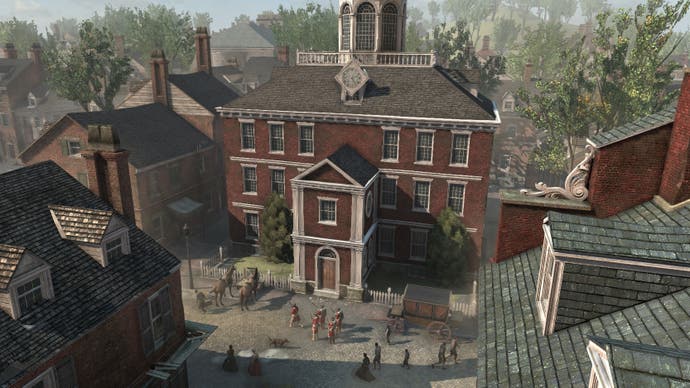
Of course, Connor's adventure isn't taking place in the game's present, and it's when you climb out of his adventure and back into Desmond's sci-fi oddity that Assassin's Creed 3 threatens to falter most. An initial journey to New York to retrieve a First Civilisation artefact is actually quite good - a simple but fun ascent through the inside of a skyscraper - but after that the present-day missions feel like they've been made by a different developer entirely (which, come to think of it, they probably have) and do little to advance your interest in Desmond's antics. Nor does his hot-and-cold relationship with his dippy father. And the game ending itself, bringing five years of tempt and tease to a close, is thoroughly weak.
In many long-running series, that might be cause for significant outrage. But in a peculiar way it's a testament to Assassin's Creed's transformation that the series' dull final moments are forgotten just as soon as you next boot the game up and Connor steps back out of his Homestead and onto the Frontier. Of course we still enjoy palling around with historical figures and hunting down artefacts that save the world in December 2012, but it's the fun you can't help but have on the way to those encounters that has come to define this series.
Assassin's Creed was once a fascinating mystery wrapped around a fun action-adventure - remember when you first loaded up the original game and it began in the Abstergo offices and you had no idea what was going on? - but that fun action-adventure game has long since eclipsed the fiction that envelops it. That's more true than ever in Assassin's Creed 3, where you're a hunter, a ship captain, a silent killer, an entrepreneur, a swashbuckling sword-fighter and many other things besides. It all serves to make this the biggest and richest Assassin's Creed game to date - maybe not the best, but a place where, for want of a better expression, everything is permitted.
